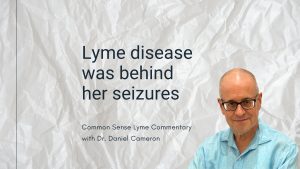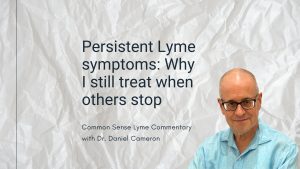Call for your appointment today 914-666-4665 | Mt. Kisco, New York

As her story continues making headlines around the country, there appears to be a sense of uneasiness among many people discussing Yolanda’s situation. When OK magazine called recently, I was asked by the reporter, “Can Lyme really cause problems like this?” The possibility that a disease, which began with a simple tick bite could progress to the point of causing such severe debilitation can be frightening.
However, Yolanda’s depiction of her struggles with neurologic symptoms from Lyme disease should be old news to the medical community. And, the public should be more aware that neurologic symptoms can develop if the disease is left unchecked.
Studies on chronic neurologic Lyme disease first began in 1990 – more than 25 years ago. Yet, there are still physicians who deny the condition exists. I have been seeing chronic neurologic Lyme disease since opening my practice in 1987.
In 1990, Drs. Logigian, Kaplan and Steere published, “Chronic neurologic manifestations of Lyme disease” in the New England Journal of Medicine [1] in which they described 27 individuals, who suffered for 3 months to 14 years with chronic neurologic Lyme disease. Their patients suffered from memory loss (81%), depression (37%), sleep disturbance (30%), irritability (26%) and difficulty finding words (19%).
Their conclusion? “Months to years after the initial infection with B. burgdorferi, patients with Lyme disease may have chronic encephalopathy, polyneuropathy, or less commonly, leukoencephalitis.”
Some common neurologic symptoms of Lyme disease include impaired attention, difficulty focusing and concentrating, poor judgment and impulse control, impaired memory and speech functions, poor problem-solving, slower mental processing, and forgetfulness.
There is treatment for the cognitive problem Yolanda is describing. Drs. Logigian, Kaplan, and Steere found that two thirds of patients with Chronic Neurologic Lyme disease improved with two weeks of intravenous antibiotics but the outcome was seldom complete. The same authors found the outcome was better for patients with Lyme encephalopathy following four weeks of intravenous ceftriaxone. [2]
However, there are also patients, like Yolanda, who have failed intravenous antibiotics treatment. Dr. Brian Fallon, from Columbia University’s Lyme and Tick-Borne Disease Research Center, and his colleagues found that individuals could present with Lyme encephalopathy an average of nine years after onset of their Lyme disease with severe cognitive problems despite a month of intravenous antibiotics. Dr. Fallon and colleagues also documented that cognitive impairment could persist despite retreatment with intravenous antibiotics.
Since Yolanda went public, several Lyme disease patients have shared their own personal struggles with neurologic symptoms on Dr. Daniel Cameron Facebook page.
“My husband has to write for me sometimes. My hands don’t want to hold the pen or are shaking too bad.”
“I had to leave a job that I loved because English no longer felt like a language I knew.”
“I had to leave my clinical social worker position because I was unable to complete documentation. What once took me 5 minutes would take me a half hour or more, just to find a common clinical term and string together a couple sentences.”
“I dropped out of my PhD program because I couldn’t organize a single paragraph anymore.”
“Once an excellent speller…can’t remember how to spell simple words sometimes.”
“My daughter had to take a medical leave from college.”
“At work I had people write things down because I couldn’t process the information. Horrible…and be a single parent. I went from three jobs to barely working.”
I find it hard to believe that 25 years after Chronic Neurologic Lyme disease was first described, the medical community can doubt Yolanda when she writes, “I have lost the ability to read, write, or even watch TV, because I can’t process information or any stimulation for that matter.”
What she is describing, is what has been described in the medical literature over and over. I have written several papers addressing the severity of chronic Lyme disease in patients, which includes neurological impairments.
We need to move on from denying that Chronic Neurologic Lyme disease exists to discussing what can we do about it.
References:
1. Logigian EL, Kaplan RF, Steere AC. Chronic neurologic manifestations of Lyme disease. N Engl J Med, 323(21), 1438-1444 (1990).
2. Logigian EL, Kaplan RF, Steere AC. Successful treatment of Lyme encephalopathy with intravenous ceftriaxone. J Infect Dis, 180(2), 377-383 (1999).



